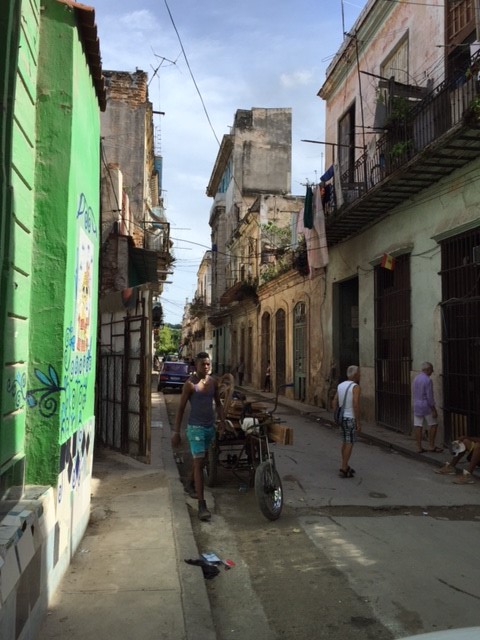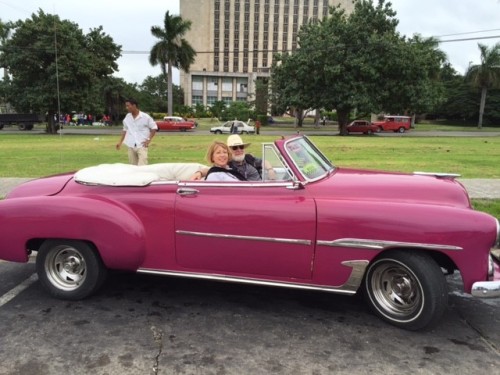
Gerry Crispin and I led a delegation of 21 senior HR executives to Cuba last week. I’m still processing what we experienced and learned, but wanted to share some high level observations for you. First of all, read Laurie Ruettimann’s blog post from yesterday here. Her take is, as always, captivating and profound.
Second, let me set the stage for you. With recent developments in the relationship between Cuba and the U.S., it seems important to begin to understand how work happens in Cuba. It may not be long before U.S. employers can open up businesses or begin to invest in Cuba’s infrastructure. And understanding the history of work since the revolution would be a critical step. Additionally, understanding the social context of the revolution and the subsequent U.S. embargo and their impact on the people, careers and lives of Cubans would be another critical step. And finally, understanding how Cuba works (or in many cases, doesn’t work) would be the ultimate learning.
So, 21 hardy HR executives set out on the 14th of November to get those questions answered. Our delegation was made up of CHROs, heads of Talent Acquisition, consultants, bloggers, job board owners, academics and other senior HR types. Age-wise we ranged from early 30’s to early 70’s, so we were an amazingly diverse group from every angle.
Because this was an education-focused delegation we met with senior level government officials in the Ministry of Work and Social Security, the Foreign Ministry, the national workers union, the Ministry of Tourism, the national Jurists union, and several other senior government representatives who could interact with us about work and employment in Cuba. Additionally we met with members of a local Committee for the Defense of the Revolution, a sort of “neighborhood watch” group that provides social activities as well as a way for the party to watch over citizens at the most grass roots level.
Our interactions were fascinating, challenging, and disturbing. I’ve been to developing nations and seen abject poverty in places like India, China, Jamaica, Uruguay and others. And in those places I’ve been aware that the governments were working hard to lift up their economies and their people. But not Cuba. And that is kind of insane. There’s an insistence that the Revolution is working and that the hardships their citizens have endured – particularly since the collapse of the Soviet Union – are all for the good of the populace in service of their communist/socialist ideals. The insistence that unemployment is 2.7% when only 4 million of their more than 11 million citizens are working seems completely out of touch. The fact that the Cuban government just raised the salaries of doctors to 1,600 Cuban Pesos a month (about $60 U.S.) is noteworthy because it was used over and over again as an example of how the government is loosening its grip on worker compensation and embracing a more market-based approach to “business.” The anticipation/fear about what will happen in the next Presidential election as Raul Castro has declared he won’t stand for reelection is palpable. In short, the world of work in Cuba is tenuous at best. Everything in Cuba is tenuous at best.

It seemed to me that the people we met with – officially and unofficially – fell into two camps: those who are true believers in the revolution and those who would like to leave Cuba this very minute and never return. Unfortunately, the true believers are all in official government positions with perks and influence, and the ones who would like to leave and never return are everyone else.
The infrastructure of Cuba is decrepit. It truly is as if time stopped in 1960. The classic cars from the 1950’s are something amazing to behold (and held together with duct tape, wire and glue), but they are the perfect example of life in Cuba: sometimes things work, but mostly they don’t. And when they do work, they don’t work like they’re supposed to and only do work because they were jerry-rigged.

Despite all of this adversity the Cuban people are warm, lovely and eager to be hospitable – particularly to Americans. Most Cubans have family in the U.S. who fled during the revolution or who left in the subsequent mass migration. More than one Cuban joked with us that the “real” capital of Cuba is Miami. These people want to be productive, to live happy lives and provide for their families. In that way they are no different than we are and they are a potential gold mine in the challenging global talent pool. The Cuban government declares 100% literacy in their population and if that’s true, they could add significantly to the global economy. If they can get to it.
Gerry Crispin said something really profound early in the trip when I asked him how he was doing. He replied, “Wonderful. Because that’s the only option.” I think the same is true for Cubans. How is life in Cuba? It’s wonderful, because to admit it isn’t is to cast aspersions on the revolution, Fidel and Che – and most importantly, because it makes the future far more terrifying than it already is.
Our trip to Cuba was fascinating, interesting, challenging, more than a little heart-breaking, and disturbing. Whatever is next for its economy, social and political structure, and its people – they need help. Lots and lots of help.





Pingback: HR Journey: Talent Management in Singapore and Viet Nam |
Pingback: Cuba and Maslow |
Let’s help them.
The trip was fascinating and very educational. We left with a totally different perspective of Cuba from what we hear in the USA. My impression now is that most Cubans are ‘content,’ possibly because they know of no other system. For most Cubans it works. I like their values that everyone has the right and the duty to work. Everyone owns their own homes. We did not see any homeless people or dire poverty. Everyone we met loved Americans.
We did meet with many top government officials and were able to distinguish between party line propaganda and reality. We also met with many people in the streets and they were open to discuss their way of life
Cubans have a different perspective on life than we have in the USA. They are more family oriented; proud of their free education and healthcare system and accept their food rationings. Most teenagers are on their cell phones, the same as in the USA. The streets were relatively clean. Citizens are not allowed guns and the streets of Havana seemed very safe. Many of the buildings are in a great state of disrepair, which will take significant capital to fix. There were a variety of the 1950s cars, but surprisingly enough, the majority of cars are much newer.
There are opportunities for the more ambitious Cubans to start their own businesses, or to work temporarily in the USA and return with some capital. They have commendable community values. and are proud to be Cubans and love their country.
I believe it would be very hard and detrimental to try and impose upon them with our ‘democratic system,’ (which certainly doesn’t seem to work too well here in the USA, other than gridlock). They do enjoy voting rights at the lower levels to select community leaders. Compared to life under Batista and Lansky, most Cubans are far better off. Naturally, significant changes are needed to enhance the lives of the people.
I recommend that the USA gradually eases the embargo to allow Cubans to enjoy the essential products of life as there are major shortages of the basic items. After 54 years, we should accept that the embargo hasn’t worked. In fact it is harmful to the people of Cuba. Both sides need to negotiate the terms for the USA to invest in Cuba. This will help their economy and be very beneficial to the Cuban people.
The trip was very fascinating and illuminating, enhanced by the camaraderie developed between the group members.
The trip was fascinating and very educational. We left with a totally different perspective of Cuba from what we have been lead to believe in the USA. My impression now is that most Cubans are ‘content,’ possibly because they know of no other system. For most Cubans it works. I like their values that ‘everyone has the right and the duty to work.’ Everyone owns their own homes. We did not see any homeless people or dire poverty. Everyone we met loved Americans.
We did meet with many top government officials and were able to distinguish between party line propaganda and reality. We also met with many people in the streets and they were open to discuss their way of life
Cubans have a different perspective on life than we have in the USA. They are more family oriented; proud of their free education and healthcare system and accept their food rationings. Most teenagers are on their cell phones, the same as in the USA. The streets were relatively clean. Citizens are not allowed guns and the streets of Havana seemed very safe. Many of the buildings are in a great state of disrepair, which will take significant capital to fix. There were a variety of the 1950s cars, but surprisingly enough, the majority of cars are much newer.
There are opportunities for the more ambitious Cubans to start their own businesses, or to work temporarily in the USA and return with some capital. They have commendable community values. and are proud to be Cubans and love their country.
I believe it would be very hard and detrimental to try and impose upon them our ‘democratic system,’ (which certainly doesn’t seem to work too well here in the USA, other than gridlock). They do enjoy voting rights at the lower levels to select community leaders. Compared to life under Batista and Lansky, most Cubans are far better off. Naturally, significant changes are needed to enhance the lives of the people and should ideally be speeded up..
I recommend that the USA gradually eases the embargo to allow Cubans to enjoy the essential products of life as there are major shortages of the basic items. After 54 years, we should accept that the embargo hasn’t worked! In fact it is harmful to the people of Cuba. Both sides need to negotiate the terms for the USA to invest in Cuba. This will help their economy and be very beneficial to the Cuban people.
It was a most enjoyable and illuminating trip, enhanced by the camaraderie developed with the rest of our group.
Don & Eunice Firth
Great post China, sounds like it was a complex and significant experience for all.
Great post China, sounds like it was a complex experience for all.
Great article China! Your last paragraph reminds me so much of our trip to India, however, for very different reasons…
Very good summation. As I continue to process information after our trip, I keep going-back to three themes: The Political, The Social, and The Economic. I think you did a great job addressing issues in all three areas.
Great perspective. Thanks.
Have loved following your pics and now this recap of your trip! Thank you for keeping us all in the loop! Sounds like quite a trip. I wish for all people to maximize themselves for good – for the good of all. Wish we could see more of that for Cuba. Perhaps in time…
Great post, China. Agree that it was an eye opening, profound experience and think you did a great job capturing the essence of what was, in sum, a pretty amazing week. Viva la revolucion!